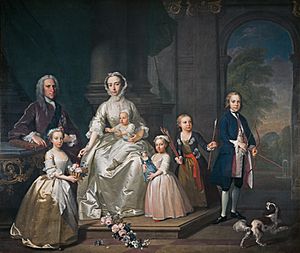James Douglas, 14th Earl of Morton facts for kids
Quick facts for kids
The Earl of Morton
|
|
|---|---|

Portrait of Douglas with his family by Jeremiah Davison, 1740
|
|
| 16th President of the Royal Society | |
| In office 1764–1768 |
|
| Preceded by | George Parker |
| Succeeded by | James Burrow |
| Personal details | |
| Born | 1702 Edinburgh, Scotland, UK |
| Died | 12 October 1768 (aged 65–66) |
James Douglas, 14th Earl of Morton (born in 1702, died October 12, 1768) was an important Scottish nobleman and a keen astronomer. He was known for supporting science, especially the study of stars and planets.
He led the Philosophical Society of Edinburgh from when it started in 1737 until he passed away. He also became the president of the famous Royal Society in London in 1764. This was a very important role for a scientist.
His Early Life and Studies
James Douglas was born in Edinburgh, Scotland. His father was George Douglas, the 13th Earl of Morton. His mother was Frances Adderley.
He went to King's College, Cambridge, a well-known university. He earned his master's degree there in 1722.
In 1746, he traveled to France. While there, he was held in the Bastille, a famous prison. This was likely because he had disagreements with the British government at the time.
Family Life
James Douglas was married two times. His first wife was Agatha Halyburton. They had three sons and three daughters together. Sadly, two of their sons died when they were young.
Their second son, Sholto Douglas, 15th Earl of Morton, became the next Earl after his father.
Later, on July 31, 1755, James Douglas married Bridget Heathcote. She was the daughter of Sir John Heathcote. James and Bridget had a son named John and a daughter named Bridget. His second wife, Bridget, lived for many years after he died.
His Legacy and Influence
Lord Morton was very important in helping to fund a famous journey. He helped get £4,000 to pay for Lieutenant James Cook's voyage. This journey was on the ship called HMS Endeavour.
Because of his support, a place in Queensland, Australia, was named after him. It is called Moreton Bay. The spelling was a small mistake in the published story of Cook's trip.
See also

